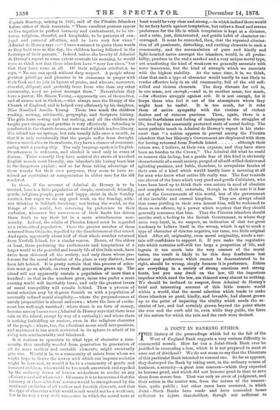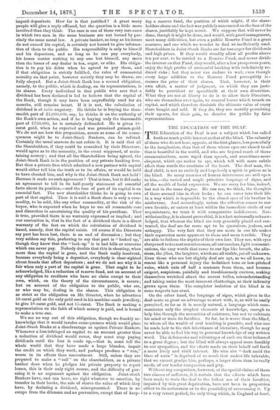A POINT IN BANKING ETHICS.
THE history of the proceedings which led to the fall of the West of England Bank suggests a very curious difficulty in commercial morals. How far can a Joint-Stock Bank ever be justified in concealing a loss, which it is not prepared to meet at once out of dividend? We do not mean to say that the Directors of this particular Bank intended to conceal one. So far as appears, they destroyed the Bank by taking over, in the ordinary course of business, a security—a great iron concern—which they expected to become good, aud which did not become good in time to save them from severe loss. That was only an error of judgment, and their action in the matter was, from the nature of the transac- tion, quite public ; but other cases have occurred, in which Joint - Stock Banks have made and have concealed losses sufficient to injure shareholders, though not sufficient to
imperil depositors. How far is that justified? A great many people will give a reply offhand, but the question is a little more involved than they think. The case is one of those very rare cases in which two men in the same business are not bound by pre- cisely the same moral law. A private banker, so long as his losses do not exceed his capital, is certainly not bound to give informa- tion of them to the public. His responsibility is only to himself and his depositors, and so long as he can pay everybody, his losses matter nothing to any one but himself, any more than the losses of any dealer in tea, sugar, or silks. His obliga- tion is to pay his debts when he agreed to pay them, and if that obligation is strictly fulfilled, the rules of commercial morality on that point, 'however strictly they may be drawn, are fully obeyed. But a Joint-Stock Bank has a second obligation, namely, to the public, which is dealing, on its representations, in its shares. Every individual in that public who sees that a dividend has been declared is led to believe that the capital of the Bank, though it may have been unprofitably used for six months, still remains intact. If it is not, the calculation of dividend is ab initio nugatory. He thinks he is buying the thou- sandth part of 11,000,000, say, he thinks it on the authority of the Bank's own action, and if be is buying only the thousandth part of 1750,000, he is certainly defrauded. He is given 18- carat gold, when he expected and was promised guinea-gold. We do not see how this proposition, severe as some of its conse- quences might be to Joint-Stock Bankers, can be refuted. Certainly the usual answers do not refute it. It is said that all the Shareholders, if they could be consulted by their Directors, would agree as to the necessity, in the event supposed, of main- taining secrecy ; and that all the Shareholders being agreed, the Joint-Stock Bank is in the position of any private banking firm. But then a private firm which admitted a new partner with capital would either tell him the truth as to its affairs, or would be held to have cheated him, and why is the Joint-Stock Bank not held ? Because it made no such agreement ? That is true, but it did make an agreement to tell in its half-yearly statement all essential facts about its position,—and the loss of part of its capital is an essential fact. The new shareholder thinks he is going to own part of that capital. Then it is said a Bank share is only a com- modity, to be sold, like any other commodity, at the risk of the buyer, who is expected when he buys to use all reasonable care and discretion in ascertaining the quality of his purchase. That is true, provided there is no warranty expressed or implied ; and our contention is, that in the fact of a dividend there is a direct warranty of the fact on which the calculation of dividend is based, namely, that the capital exists. Of course if the Directors say part has been lost, there is an end of discussion ; but they very seldom say this, preferring to say that part is "locked up," though they know that the " lock-up " is in bad bills or concerns which can never pay. Nobody doubts that this is cheating, when more than the capital is gone, and the Bank really insolvent, because everybody being a depositor, everybody is clear-sighted about frauds that affect depositors ; and we do not see why it is fair when only a part of the capital is gone.. That ought to be acknowledged, like a reduction of reserve fund, not on account of any obligation to creditors who have no claim except to their own, which, on the theory of the circumstances, is secure ; but on account of the obligation to the public, who are, or who may be, dealing in the shares. This obligation is as strict as the obligation on Mr. Streeter, when he advertises 18-carat gold as the only gold used in his machine-made jewellery, to give 18-carat gold, and not 15-carat. The Bank is making a representation on the faith of which money is paid, and is bound to make a true one.
We see no way out of this obligation, though we frankly ac- knowledge that it would involve consequences which would place Joint-Stock Banks at a disadvantage as against Private Bankers. Whenever a loss infringed on capital to an amount greater than a reduction of dividend would cover, they must stop paying dividends until the loss is made up,—that is, must tell the whole world that they have made a large blunder, impair the credit on which they work, and perhaps produce a "run," worse in its effects than concealment. Still, unless they are prepared to make a "call" on the shareholders, as a private banker does when he pledges his private property to repair losses, this is their only right course, and the difficulty of pur- suing it is no argument against the obligation. Joint-stock Bankers have, and can have, no right whatever to sanction, by transfer in their books, the sale of shares the value of which they have, by declaring a dividend, misrepresented. There is no escape from the dilemma and no preventive, except that of keep.. ing a reserve fund, the position of which might, if the share- holders chose and the fact was publicly announced on the face of the shares, justifiably be kept secret. We suppose that will never be done, though it might be done, aud would, with good management, meet many difficulties, but even a public Reserve Fund is a great resource, and one which we wonder to find so inefficiently used. Shareholders in Joint-Stock Banks are far too eager for dividends and high prices. If they would steadily allow all profits above ten per cent, to be carried to a Reserve Fund, and never divide the interest on that Fund, they would, after a few prosperous years, enjoy the high profits of successful banking with indefinitely re- duced risks ; but they never can endure to wait, even though every large addition to the Reserve Fund perceptibly in- creases the price of their shares. That, however, is their own affair, a matter of judgment, on which they can justi- fiably be provident or spendthrift at their own discretion. What they are not at liberty to do is to allow their Directors, who are themselves over again, to conceal losses which trench on capital, and which therefore diminish the ultimate value of every share bought and sold. If they do, they are morally permitting their agents, for their gain, to deceive the public by false representations.







































 Previous page
Previous page